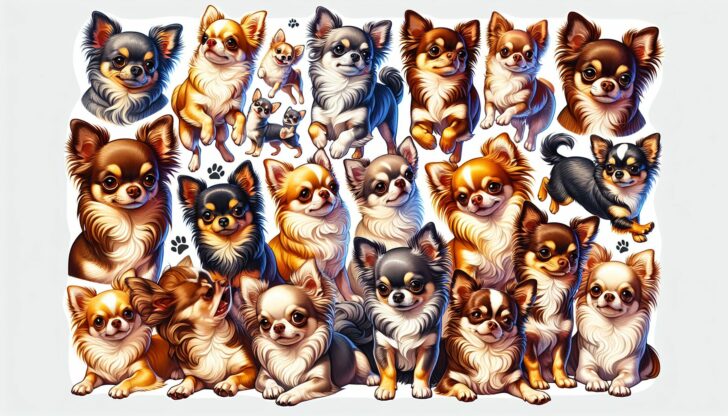Curious about what makes Chihuahuas unique? This tiny breed packs a lot of personality and charm into a small package. In this guide, we’ll detail the characteristics of Chihuahua, covering their physical traits, personality, health concerns, and care needs. Whether you’re considering adding one to your family or just intrigued by these fascinating little dogs, read on to learn more about the characteristics of Chihuahuas.
Table of Contents
Key Takeaways
Chihuahuas are small but energetic dogs, perfect for urban living and strong companionship.
They require regular grooming, exercise, and socialization to stay healthy and well-adjusted.
Health check-ups, dental care, and preventive measures are essential to address common health issues in Chihuahuas.
The Essential Guide to the Characteristics of Chihuahua Dogs

Chihuahuas are more than just the smallest dog breeds; they are bundles of energy and affection. This guide aims to give you a thorough understanding of the Chihuahua breed, covering everything from their physical traits to their temperament, health considerations, and much more.
This guide will provide a clear understanding of how to care for and appreciate these tiny but mighty dogs.
Introduction
Chihuahuas are recognized for their vibrant personalities and compact size, making them popular companion animals. Their ability to adapt to various living situations, including small apartments, makes them ideal city pets. Chihuahua chihuahuas are especially suited for this lifestyle.
We’ll explore the key characteristics of Chihuahuas, covering their physical traits, personality, health considerations, and training needs. If you’re looking for a dog that fits well into urban living and brings a lot of heart into a small package, a Chihuahua might be just the pet for you.
Physical Traits of Chihuahuas

Physical diversity is a hallmark of the Chihuahua breed. These tiny dogs, classified as toy breeds, are some of the smallest dog breeds in existence. They come in various colors and coat types, each contributing to their distinct appearance.
Recognizing these physical traits helps in the proper care and appreciation of these little companions.
Size and Weight
Chihuahuas are one of the smallest dog breeds, typically weighing between 2-6 pounds and standing around 5 to 8 inches tall. Despite their small size, they have a sturdy and well-proportioned build, making tiny dog chihuahua puppies a popular choice for pet owners.
Their petite stature makes them ideal for apartment living and easy to carry around.
Coat Varieties
Chihuahuas come in two primary coat varieties: short and smooth, and long and soft. Both types require regular grooming to maintain coat health.
Long-haired Chihuahuas need more frequent brushing to prevent matting, while short-haired varieties benefit from occasional brushing to remove loose hair and keep their coat shiny.
Distinct Features
One of the most distinctive features of Chihuahuas is their apple-shaped head, characterized by a domed skull, short pointed muzzle, big round eyes, and large pricked-up ears. Their unique head shape sets them apart from similar breeds and adds to their charming, expressive faces.
Personality and Temperament

Chihuahuas are known for their vibrant and energetic chihuahua personality. Despite their small size, they have a strong bond with their owners and thrive in environments where they receive consistent companionship. Their loyal and affectionate nature makes them delightful companions, though they can also be a bit sassy and attention-seeking, reflecting their chihuahua temperament.
Loyalty and Affection
Chihuahuas often form strong attachments to their owners, seeking constant companionship. Their need for attention is a significant aspect of their personality, fostering deep bonds with their human families. Their affectionate nature makes them ideal lap dogs, always ready to snuggle and be close to their loved ones.
Energy and Playfulness
Chihuahuas are quite active and enjoy being kept busy. Interactive games are an effective way to meet their exercise needs and keep them entertained. However, when they are bored, they can become prone to barking.
Their playful nature makes them great companions for families, though care should be taken when they are around very young children.
Interaction with Other Pets
Socialization is essential for Chihuahuas to interact well with other dogs and pets. Exposure to various environments and people helps them develop better social skills and prevents overprotectiveness or anxiety.
Well-socialized Chihuahuas usually get along well with other dogs and cats, though they should be monitored around larger animals to prevent any harm.
Health Considerations for Chihuahuas
Chihuahuas, like all dog breeds, are prone to specific chihuahua health issues that require regular monitoring. Despite their small size, they have a life expectancy ranging from 14 to 16 years, showcasing their resilience.
Knowing common health issues and preventive care helps in maintaining their health and well-being.
Common Health Issues
Common health issues in Chihuahuas include patellar luxation, heart disorders, and dental problems. Patellar luxation is a dislocation of the kneecap, while heart disorders can be both congenital and acquired.
Dental issues, such as gum disease and periodontal disease, are also frequent due to their small jaws.
Learn more 10 Most Common Chihuahua Health Problems.
Preventive Care
Regular veterinary check-ups help maintain your Chihuahua’s health. This includes annual dental check-ups and booster vaccinations to prevent health conditions. Preventive measures like brushing teeth and regular dental descales can help prevent periodontal disease.
Regular veterinary visits are essential for ensuring a healthy life for Chihuahuas.
Importance of Pet Insurance
Pet insurance helps Chihuahua owners manage unexpected medical expenses. Having pet insurance can alleviate the stress of costly veterinarian bills during emergencies, allowing owners to focus on their pets’ health rather than financial worries.
Training and Socialization
Proper training and socialization are crucial for Chihuahuas to avoid behavior issues. These tiny dogs can be quite reserved towards strangers, requiring time to warm up.
Consistent training and socialization can make Chihuahuas well-behaved and friendly companions.
Obedience Training
Chihuahuas can be trained effectively using positive reinforcement techniques. Rewarding desired behaviors encourages their recurrence, helping in teaching commands and building a strong bond between owner and Chihuahua.
Incorporating play into training sessions can enhance their learning experience.
Socializing Your Chihuahua
Early socialization is crucial for developing a well-adjusted and friendly temperament in Chihuahuas. Without early socialization, Chihuahuas may develop aggression or anxiety, especially around strangers and other dogs. Socializing your Chihuahua ensures they are comfortable and well-behaved in various situations, reducing anxiety and potential aggression.
Exercise Needs
Chihuahuas require at least 30 minutes of exercise daily to stay healthy. Regular exercise helps maintain a healthy weight and overall health.
However, it is important to avoid overexerting them, as they are prone to certain health conditions.
Grooming and Nutrition
Chihuahuas require regular grooming and a balanced diet to stay healthy and happy. Their grooming needs vary depending on their coat type, and their nutritional needs must be met to prevent obesity and other health issues.
Grooming Routine
Long-haired Chihuahuas may require daily brushing to prevent matting, while short-haired varieties need only occasional brushing.
A grooming routine is essential for maintaining the coat health and overall well-being of grooming chihuahuas.
Nutritional Needs
High-quality pet food ensures Chihuahuas receive proper nutrition. Their exact food intake depends on factors like age, size, and activity level.
Including a diet that requires chewing, such as dental chews, can help maintain their dental health.
Dental Care
Chihuahuas require special dental care due to weak teeth caused by their small jaws. Regular dental cleanings and tooth extractions are recommended to maintain their dental health.
Living with a Chihuahua
Living with a Chihuahua is rewarding, as they thrive in households where owners spend quality time with them. Meeting their needs and ensuring a safe environment is key to a happy, healthy life together.
Suitable Living Environment
Chihuahuas are well-suited to live in small homes and apartments, making them ideal city pets. Their small size increases the risk of wildlife attacks, so using a harness instead of a collar prevents neck injuries while walking them.
They can be trained to use wee wee pads or litter boxes for indoor toileting.
Safety Precautions
Chihuahuas are delicate and should never be left alone for long periods to prevent potential dangers from larger dogs or wildlife. They are generally not recommended for homes with very young children due to difficulties in safely monitoring interactions.
To keep them safe outdoors, it is essential never to leave them unattended and consider using wildlife protection vests, as well as ensuring they are microchipped.
Travel and Outdoor Activities
Chihuahuas enjoy several outdoor activities, such as short walks and playtime, which can be beneficial during travels. Regular walks and playtime are essential for their physical fitness and mental stimulation, especially during travels.
History and Origin of Chihuahuas
Chihuahuas are one of the oldest dog breeds in the Americas, with a history tracing back to pre-Columbian times. Originating from ancient Techichi dogs of Mexico, Chihuahuas have a rich cultural heritage and have been treasured as companions for centuries.
This historical significance highlights their longstanding presence in canine history and the deep bond they share with humans.
Ancient Roots
The Chihuahua breed originated in the Mexican state of Chihuahua during the 9th century and is descended from the ancient Techichi breed. These small native dogs, known as the modern chihuahua, were companions to ancient Mesoamerican civilizations and played a significant role in their cultures.
The modern Chihuahua’s name is derived from the state of Chihuahua, highlighting its deep-rooted connection to the region.
Modern Development
The recognition of Chihuahuas by the American Kennel Club (AKC) in 1904 marked a significant milestone in their modern history. This official status confirmed their popularity among dog enthusiasts and solidified their place in dog breeding.
The AKC recognition helped enhance their popularity and allowed for the standardization of the breed.
Impact of Breeding
Overbreeding has led to various health issues in Chihuahuas, emphasizing the need for responsible breeding practices. Reputable breeders prioritize the health and temperament of their breeding stock to reduce these issues.
Responsible breeding practices ensure the longevity and well-being of the Chihuahua breed.
Choosing a Chihuahua Puppy
Choosing a healthy Chihuahua puppy ensures a long, happy life together. With many Chihuahuas being overbred, finding reputable breeders or considering adoption from a rescue can help ensure you select a well-adjusted puppy.
Assessing the health and temperament of the puppy is crucial before making your selection.
Finding Reputable Breeders
Selecting a reputable Chihuahua breeder increases your chances of having a healthy dog. Resources such as the Chihuahua Club of America and the AKC search tool can help identify reputable chihuahua breeders.
A responsible breeder prioritizes socialization and early training in their puppies.
Adoption Options
Many local shelters and rescue organizations offer specific programs for Chihuahuas seeking new homes. Organizations like Chihuahua Rescue & Transport specialize in finding homes for Chihuahuas of various ages and temperaments.
Adoption is a wonderful option that gives a second chance to dogs in need.
Preparing for a New Puppy
Before bringing a Chihuahua puppy home, gather necessary supplies like a crate, food and water bowls, and grooming tools. Puppy-proofing your home protects both the puppy and your belongings.
Establishing house rules and creating a schedule for feeding and potty breaks can help your new Chihuahua adjust smoothly.
Summary
In summary, Chihuahuas are small dogs with big personalities. They are loyal, affectionate, and adaptable pets that can thrive in various living situations. Understanding their physical traits, personality, health considerations, and training needs is essential for providing the best care for these delightful companions. Whether you choose to adopt or buy from a reputable breeder, ensuring your Chihuahua’s well-being through proper care and training will lead to a fulfilling and joyful relationship.
We hope this guide has provided you with valuable insights into the world of Chihuahuas. With the right knowledge and preparation, living with a Chihuahua can be a rewarding experience filled with love and companionship. Embrace the journey with your tiny but mighty friend and enjoy every moment of your time together.
Frequently Asked Questions
What are the common health issues in Chihuahuas?
Chihuahuas often face health issues such as patellar luxation, heart disorders, and dental problems. It’s important to keep an eye on their health to ensure they stay happy and thriving!
How much exercise does a Chihuahua need?
Chihuahuas need at least 30 minutes of exercise every day to stay healthy and fit. So, make sure to incorporate some fun walks or playtime into their routine!
How can I find a reputable Chihuahua breeder?
To find a reputable Chihuahua breeder, check resources like the Chihuahua Club of America and the AKC search tool. Look for breeders who emphasize socialization and early training in their puppies.
What grooming needs do Chihuahuas have?
Chihuahuas have varying grooming needs depending on their coat type; long-haired ones benefit from daily brushing to avoid matting, while short-haired Chihuahuas only need occasional brushing. A consistent grooming routine is key to keeping their coats healthy.
Are Chihuahuas good with children?
Chihuahuas can be good with kids when they’re socialized well and interactions are supervised, but they’re usually not the best choice for families with very young children due to their small size. Just keep an eye on their interactions to ensure everyone stays safe and happy!









